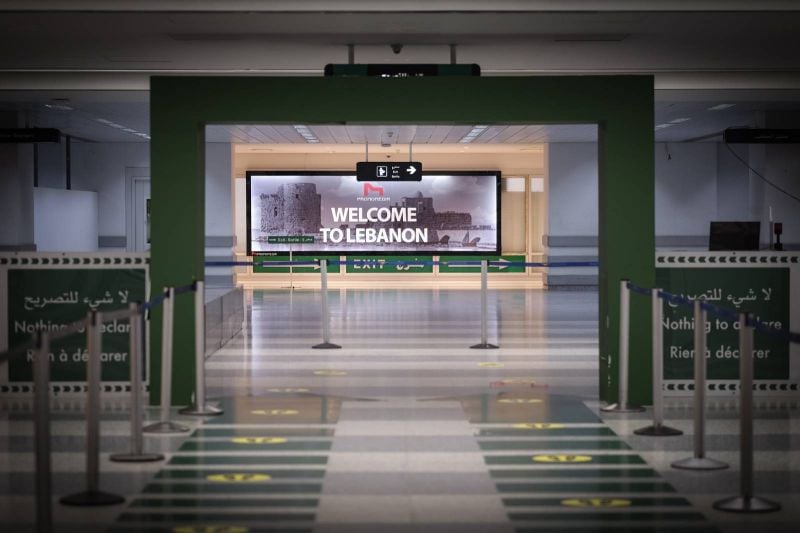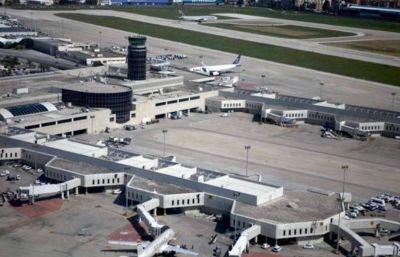
A "Welcome to Lebanon" billboard displayed at the Beirut International Airport arrivals terminal. (Credit: João Sousa/L'Orient Today)
BEIRUT — Several airlines have adjusted their activity in the region over the last six months in response to Israel's war on Gaza and fighting at the Lebanese-Israeli border, by either suspending or reducing the frequency of their flights to Beirut and Tel Aviv.
For a period, air traffic resumed a level of normalcy, but the latest uptick in regional tensions this month, between Israel and Iran especially, once again put airlines on their toes. Several Middle Eastern countries temporarily closed their respective airspace on the night of April 13, in the moments leading up to Teheran's much-publicized retaliation to an Israeli attack on the Iranian consulate in Damascus on April 1.
In every wave of cautionary measures taken by airlines, the German Lufthansa Group reacted more dramatically than most other airlines. Why?
Successive suspensions
As early as the second week following the outbreak of the Gaza war on Oct. 7, 2023, Lufthansa and its subsidiary SWISS suspended their flights to Beirut for a significant length of time, with several extensions. It was not until mid-December that Lufthansa resumed service to the Lebanese capital, by which time other airlines were operating their routes almost normally, albeit with some adjustments.
In mid-April, the situation changed again. The two airlines suspended their flights on the night of April 13 to 14, but did not reinstate them once the airspace had reopened, preferring to set an observation period of up to Aprli 30 before making a decision.
On the other end of the spectrum, Middle East Airlines only canceled a handful of flights when Lebanese airspace was closed and returned to almost normal operations in the following 24 hours. And while Polish carrier LOT gave the impression for a moment of following Lufthansa's example by canceling two flights, it didn't cancel any further and maintained the subsequent routes.
So why is Lufthansa, which is over 70 percent German-owned — but also counts US asset manager Blackrock among its shareholders, with three percent of the total — more cautious than other airlines when it comes to its Beirut routes?
Contacted by L'Orient Today, the German group dismissed the issue: “The safety of passengers and crews is always the top priority. The Lufthansa Group does not rely solely on government assessments, but evaluates the current safety situation itself and then makes its own decisions.”
Politics and profitability
Lufthansa's main motivation is security, according to a source from one of the company's subsidiary airlines — which includes SWISS, Aerologic (which it shares equally with Deutsche Post AG), Air Dolomiti, Austrian Airlines, Brussel Airlines, Edelweiss Air AG Eurowings, and SunExpress.
“They are not reassured about the security situation,” the source said, adding that Germany could be indirectly involved in such a decision. The only German airline still serving Lebanon is SundAir, a charter airline. The fact that the Lufthansa Group is also suspending its flights via Teheran until April 30 corroborates this explanation.
But for other industry stakeholders, the security risk is not the only factor at play.
Jean Abboud, President of the Association of Travel and Tourism Agencies in Lebanon (Attal), believes that Lufthansa's decision could be linked to political pressure on the group: “They know that the airport is safe,” he told L'Orient Today.
This decision concerns not only Lufthansa but also Austrian Airlines, while SWISS has already announced that it will resume flights to Tel Aviv on April 25.
Two sources — one from Beirut International Airport and another working as a pilot on flights to Asia — told L'Orient Today that they consider the economic factor to be the main driving force behind the German company's heightened sense of caution, as well as its moves to relax cautious measures.
Lufthansa and SWISS resumed flights to Beirut in mid-December as the diaspora returned to Lebanon for the festive season, the airport source pointed out, despite the fact that the war in Gaza and southern Lebanon was ongoing.
In Israel, Lufthansa only resumed flights to Tel Aviv on Jan. 8, in the middle of what is usually a slow season in Israel. “I bet we will soon see Lufthansa and its subsidiaries back in Beirut as summer approaches if the security situation remains relatively stable,” the source said ironically.
The pilot explained that the economic factor depends on several parameters, including the risk, how risk is taken into account by the airline's insurer, the standard occupancy rate of flights during a given period, and the length of routes. Some airlines, for example, do not fly over Syria, which makes them less competitive than others on certain routes. Competition may also play into the decision-making process.
Added to this is the fact that airlines often operate at a loss during the off-season, only to make up for it by inflating prices during the high season. “I wouldn't take too much risk in assuming that the Lufthansa Group seized the security pretext to temporarily suspend unprofitable or low-profit flights,” the pilot surmised.
- Even if Netanyahu wanted de-escalation with Lebanon, a law could make it difficult: Media report
- To background of bombs, Palestinians flee Rafah to seek shelter elsewhere once again
- Hamas accepts Qatar-Egypt cease-fire proposal, Israeli official describes move as 'ruse': Day 213 of the Gaza war
